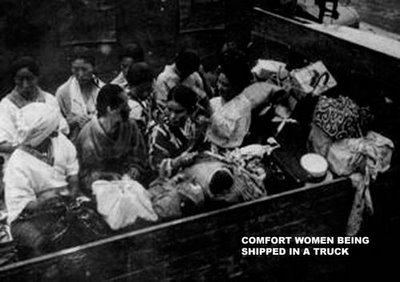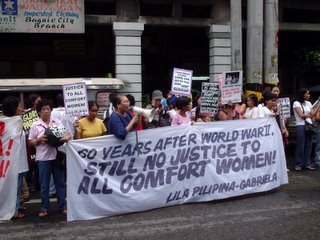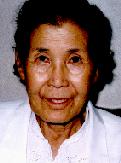jugun ianfu

Thats the new phrase I learnt today. It's Japanese for "military comfort women".
This evening at Roger Williams University, Ms. Ok Sun Kim and Ms. Yong Soo Lee came to speak to an audience about the treatment of 200,000 young girls, most of them Korean, at the hands of the Japanese military during WWII. Ms. Kim and Ms. Lee were accompanied by a translator and a documentary which explained what being
 (Jugun Ianfu) meant to these women.
(Jugun Ianfu) meant to these women.The two little old women are now in their early 80's. At the time of their enslavement, they were 15 years old.
According to Dr. Chunghee Sarah Soh, Ph.D. of the San Francisco State University, Jugun ianfu were created by the Japanese Army because their goal was to
"... enhance the morale of the military by providing amenities for recreational sex. The authorities believed such amenities would help prevent soldiers from committing random sexual violence toward women of occupied territories, which became a real concern after the infamous Nanjing Massacre in 1937. Besides its reputation, the military authorities were also concerned with the health of the troops, which prompted their close supervision of the hygienic conditions in the comfort stations in order to help keep sexually transmitted diseases under control".
It wasn't just Korean women who were targeted. According to Dr. Soh's research, 80% were Korean, but comfort women were enslaved from villages throught Japanese occupied territory-- They were taken from Taiwan, the Philippines, Indonesia, Burma and the Pacific islands.

From the testimonials as well as research reports, it's evident these women were subject to horrific treatment. The only reparation ever received was in 1948 when a tribunal in Batavia (today's Jakarta) convicted Japanese military officers who had forced 35 Dutch women into becoming comfort women. There was no mention made at that time of comfort women of any other race or nationality.
The victims of this practice have suffered diseases, addictions and/or a ruptured uterus. They have lived in loneliness and poverty. They have received no compensation and no apology from the Japanese government. They have been aging in silence. Until now.
In 1991, Kim Hak Sun (who was featured in the documentary that was shown this evening)gave the first public testimonial. Since then, more has been written and said to make sure the issue goes beyond the confines of regional politics in Japan and North & South Korea.

At present, Japanese Conservatives deny the existence of any evidence that points to the practice of coercing young girls into being the army's comfort women.
This wasn't the first time in history that women received such treatment. I have heard of this practice having occured amongst Nordic tribes, the Romans, Greeks and African tribes. U.N troops have been accused of the same crime in Kossovo. But the faces and words that I saw on that screen today made an impression like no Homeric talk of female slaves could have ever done.
I saw Ms. Ok Sun Kim outside in the hallway, as I was zipping up my jacket. A gentle graceful woman in silk and white slip-on shoes, she returned my bow with one of her own, and with a smile, went back into the hall. I stood there, mouth agape, wishing I spoke enough Korean to say "thankyou" and "sorry", though it would've sounded as stupid then as it does now.
Ms. Yong Soo Lee, the second "grandmother", as they were referred to the whole evening, had an interesting story to tell. She has told it before to a Chinese newspaper, and I quote it here:
"There was a 'comfort station' in Taiwan where I then received pilots who belonged to the kamikaze, a special suicide brigade."
One of Japanese kamikaze pilots, who repeatedly raped her in Taiwan, told Ms. Lee that she was his first love.
"That Japanese soldier gave me a Japanese nick-name, 'Toshiko'. And the kamikaze pilot taught me a song. He made up a song, because he was afraid he would die when he finally had to fly.
"It's in Japanese," Ms. Lee said, and then she softly sang the lilting tune which she never forgot.
"The song goes like this," she added, translating the Japanese into Korean, which was then rendered into English by a translator during the interview:
"The fighting planes are taking off / Taiwan is disappearing far below / Clouds appear / Nobody is saying goodbye to me / One person who can cry for me is Toshiko / We will fight in Okinawa / If I die, I will guide you to your mother / So please don't cry, because you will go back to your mother."
That shred of hope, amid their mutual doom and suffering, at least allowed Ms. Lee to believe she might survive.
"I think he is my savior. I still thank him," she said, clarifying that she felt no romance for him.
"He came to me many times. That soldier told me I was his first love."
Occasionally weeping while telling her tale, Ms. Lee said the kamikaze pilot "gave me all his soap, and other things for taking care of myself, because he said he was leaving tomorrow to die."
Ms. Lee never married.
For the whole story, click here.
Again-- this is not the first time women have been used and abused. This will not be the last time. But this is not about casting stones-- It is about recognizing history. Ms. Kim and Ms. Lee want an official apology. And they want to go back to Korea. May whichever god is listening, grant it to them.
For more on comfort women, visit:
http://www.cmht.com/cases_cwcomfort3.php
http://www.mogef.go.kr/english/dev/victims/index.jsp
http://www.comfort-women.org/v2/

6 Comments:
heart breaking. poignant.
and the way you have so matter of factly presented everything makes it so much more gut wrenching...
Remarkable tale -- the particular story paints a more vivid picture than overall statistics; the two together are an astonishment. Of course another side of this (another aspect of thinking about it), is (presumably) the likelihood that the Japanese government's rational consideration was not unfounded: that is, other diverse forms of suffering might have predictably ensued had they not decided upon this "solution"; instead, these forms of suffering were caused. I don't know if this complicates anything particularly; a weave of complex causality always underpins conditions of this sort. In any event, what these women now evidently seek seems remarkably modest in scope: an official apology and a responsible account of their historical experience. Are not institutions such as the United Nations designed, in part, to hear such grievances? -- or at least, is there no facet of the UN that can, as a matter of international diplomacy, grant these women a due hearing?
moving. very nicely written. and the fact that all they want for the attrocities comitted is an apology (that is wayy overdue)makes it all that more poignant.
Could life be more wretched than what you have just narrated? Not many have the courage to look ahead for optimism after such horrendous treatment. The underlying irony is that the soldiers are glorified and idolised for their so called valour while the real martyrs are doomed to suffer. Hats off to these brave women who stood up against oppression, not forgetting the writer of the article.
Very moving. It reminds me of the book "Knights of the Bushido: A short history of Japanese war crimes" by Lord Russell, and the book "The Divine Wind" The story of Kamikaze pilots" that I read some years ago. War spared no one, neither the 'victors' nor the 'victimized'. Each lost in their own way. Well written.
Very moving. It reminds me of the book "Knights of the Bushido: A short history of Japanese war crimes" by Lord Russell, and the book "The Divine Wind" The story of Kamikaze pilots" that I read some years ago. War spared no one, neither the 'victors' nor the 'victimized'. Each lost in their own way. Well written.
Post a Comment
<< Home